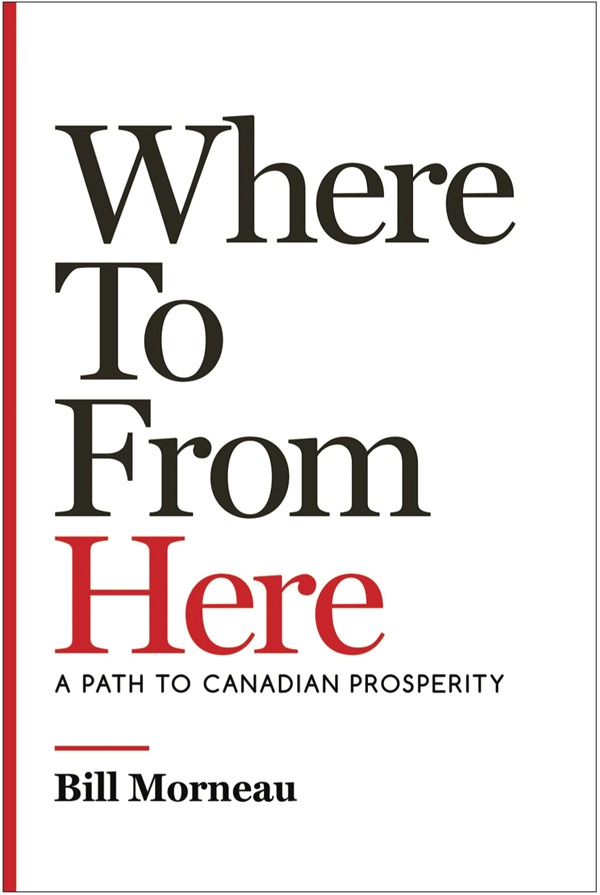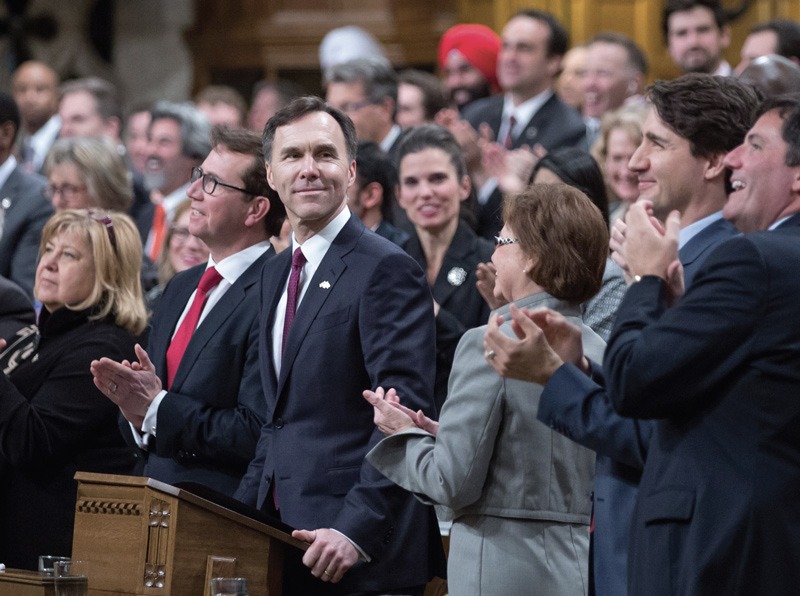‘Where To From Here’: Morneau’s Exit Memo and Mission Statement

Where To From Here: A Path to Canadian Prosperity
By Bill Morneau with John Lawrence Reynolds
ECW Press/January, 2023
Reviewed by Kevin Page
Where To From Here is a political economy book by the former Finance Minister Bill Morneau. It tells the story of the successes and stumbles of the Liberal government from a finance minister’s perspective; from the taking of power in 2015 to his resignation in the summer of 2020. Like the popular book from a fellow cabinet minister who also resigned, Jody-Wilson Raybould (Indian in Cabinet: Speaking Truth to Power), there is advice to improve governing and the lives of Canadians.
I wanted the book to address three questions:
One, what was it like for a successful businessman to transition to federal finance minister with no prior legislative experience?
Two, what role did the finance minister play (or not) in shaping and implementing the Liberal policy agenda, including fiscal policy?
Three, what would it take for a finance minister to resign in the middle of a global health and economic crisis?
The book covers these questions and more.
Morneau struggled with a career transition. He found politics “harsh” and “confusing”. The thick skin required to handle the darker and edgier sides of partisan politics and national media scrutiny is largely developed with experience. Prior to becoming a federal finance minister, Morneau’s experience with politics was largely as an adviser to governments or running large boards for charitable organizations. He was on the outside looking in.
It is a big transition to go from running a large international human resource company to becoming a federal finance minister responsible for implementing a very progressive policy agenda. Having said this, Morneau did his best to go up the learning curve.
He worked hard to get the nomination and to win the hearts and minds of voters in his riding of Toronto Centre. He knocked on doors. He connected with people. He tells a touching story of an interaction with a 13-year-old volunteer whose family came from Bangladesh. She shared a note. They needed access to housing. He kept the note. He went into politics for the right reasons – responsive government. His government kept their promises on strengthening housing policy. We are all better for it.

With the nomination, Morneau contributed to the development of the 2015 Liberal election platform. He had ideas on pensions and the economy that were grounded in business experience. That platform and the stellar campaign performance by Justin Trudeau paved the way to a Liberal majority victory.
I thought it was a mistake for Prime Minister Trudeau to nominate an inexperienced politician to the position of finance minister. It is too big a jump for such a powerful cabinet position. A less bold move by the PM would have been to appoint a senior stalwart like Ralph Goodale or Scott Brison. Why not take a strong candidate like Bill Morneau and give him some cabinet experience in an economic portfolio (Industry, Natural Resources, Transport, Innovation, etc.) before consideration for Finance?
If we look back in time, there have been some strong but independent relationships between prime ministers and their finance ministers: Harper and Flaherty; Chrétien and Martin; Mulroney and both Mazankowski and Wilson. Was Bill Morneau bound to fail?
With his appointment to Finance, the book tells the story of how Morneau reached out for advice to previous finance ministers and prime ministers. He got great advice. With a serious work ethic, he went to work picking a strong team of advisers, getting to know his department and mandate. It was a textbook approach. Nonetheless, he was forced to jump from the fire into the frying pan.
On policy, the book is largely (but not entirely) focused on the implementation of the Liberal 2015 election platform. Morneau rightly expresses a deep satisfaction with his work in steering the implementation of legacy initiatives related to the child benefit, worker income tax benefit, income tax reform, pensions, housing, infrastructure, and First Nations policies. It is a long and impressive list of policy successes that was largely front-end loaded in the government’s mandate. It was done with a relaxation of fiscal constraints but in keeping with a declining debt-to-GDP ratio.
Reading the book, one can sense the deep expertise and interest of Morneau in areas of pensions, tax reform and housing. Ideas and words on policy directions and risks flow naturally with numbers.
Along with these policy successes, Morneau is open about policy stumbles, including small business tax reform and the Canada Infrastructure Bank. The former finance minister admits that the government struggled to maintain policy momentum once many of the 2015 election platform commitments were launched. They were not the first government to experience the challenge of rejuvenation as the political cycle lengthens through the mandate.
Many readers will enjoy the sharing of back-channel stories on a range of domestic and international policy initiatives. One of the strong themes of the book is the importance of building trusting relationships to make progress on public policy. It is a virtue understood and executed well by Morneau in his business experience. The challenge was to build relationships in a political space marked by different partisan and ideological perspectives, a range of skill sets, large egos and media scrutiny.
We learn that Finance Canada and the Prime Minister’s Office (PMO) were not in sync on the size of fiscal supports necessary to address COVID-19. Finance wanted less. PMO wanted more. In retrospect, Morneau and Finance were right.
The book opens and closes with the meeting between the prime minister and finance minister at Rideau Cottage in the summer of 2020. Morneau resigned amid a contracting scandal involving his interactions with the controversial WE charity, saying at the time that he was leaving to pursue the post of secretary general of the Organisation for Economic Cooperation and Development (OECD), but he was effectively shown the door in the middle of a global health and financial crisis. Rumours were circulating. We learn that Finance Canada and the Prime Minister’s Office (PMO) were not in sync on the size of fiscal supports necessary to address COVID-19. Finance wanted less. PMO wanted more. In retrospect, Morneau and Finance were right.
This book will be read by people interested in trying to understand the legacy of Prime Minister Justin Trudeau and the ongoing Liberal government.
I recommend this book to people thinking of making the transition from private to public life. We need more people like Bill Morneau to become interested in being an elected representative. We need to read the impact of a 13-year old Bangladesh- Canadian girl who shared a note on her family housing problem with a wealthy Canadian businessman and future finance minister. Bill Morneau kept the note, and the promise.
Kevin Page is the President of the Institute of Fiscal Studies and Democracy at the University of Ottawa, former Parliamentary Budget Officer and a contributing writer for Policy Magazine
